I only tried making beer once last year. I used liquid extract. Accidently, i poured the sediment from the boil into the fermenter. I dont know if thats why it came out terrible or the fact my buddy was not paying attention to our strict sanitation methods-- i let him pass not wanting to insult him too mant times
This time i will do it alone. I have mash tum--sparge water tank, fermenters and a fair amount of experience with wine and whiskey making.
SOO FOR MY QUESTIONS
I purchased the grains(( for a 5 gallon batch)) at a store in tampa that specializes in grains for brewers. They had a book with diferent beers listed and the grain bill. The sheet also contained instructions. I dont find them detailed enough for an in experienced beer brewer like me
THE BILL
9 lbs. crisp pearl pale ale
8 oz crisp crystal 45
8 oz crisp amber malt
HOPS
1 oz chinook 60 minutes
1 oz challanger 30 minutes
1 oz challanger 5 minutes
sacrification rest 152 deg for 60 minutes
i imagine the sacrification rest is what i would call mashing the grains
the temp is the desired temperature, so i will get the mash tun about 15 degrees hotter before adding the grain.
My mash tun is completely insulated
then after mashing and sparging to get about 5 1/2 gallons , I put a fire under the boiling pot. I have an 8 gallon pot.
Watch carefully so it doesnt boil over and add hops as the above times ask.
Do i use a hops bag????
after the boil, quick cooling and pitching my starter bottle prepared in advance.
I suspect that boiling drove out all the oxygen so i want to aerate with a stone for for about one hour as the temperature is coming down to about 70F(pitching temp as i see it)).
I NEED SOME COACHING PLEASE
This time i will do it alone. I have mash tum--sparge water tank, fermenters and a fair amount of experience with wine and whiskey making.
SOO FOR MY QUESTIONS
I purchased the grains(( for a 5 gallon batch)) at a store in tampa that specializes in grains for brewers. They had a book with diferent beers listed and the grain bill. The sheet also contained instructions. I dont find them detailed enough for an in experienced beer brewer like me
THE BILL
9 lbs. crisp pearl pale ale
8 oz crisp crystal 45
8 oz crisp amber malt
HOPS
1 oz chinook 60 minutes
1 oz challanger 30 minutes
1 oz challanger 5 minutes
sacrification rest 152 deg for 60 minutes
i imagine the sacrification rest is what i would call mashing the grains
the temp is the desired temperature, so i will get the mash tun about 15 degrees hotter before adding the grain.
My mash tun is completely insulated
then after mashing and sparging to get about 5 1/2 gallons , I put a fire under the boiling pot. I have an 8 gallon pot.
Watch carefully so it doesnt boil over and add hops as the above times ask.
Do i use a hops bag????
after the boil, quick cooling and pitching my starter bottle prepared in advance.
I suspect that boiling drove out all the oxygen so i want to aerate with a stone for for about one hour as the temperature is coming down to about 70F(pitching temp as i see it)).
I NEED SOME COACHING PLEASE
Last edited:





